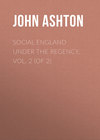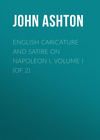Kitabı oku: «The Devil in Britain and America», sayfa 7
‘When she got upon the Horse to go home, it was a great while before she was able to get upon him, and was flung sometimes backwards, other whiles turn’d with her face to the horse’s tail, and handled very sadly; yet, ’tis observed, that he hath not much power to hurt her: for she often declares, that, being now accustomed to his tricks, and consequently not so much affrighted, the temptations he injects into her minde, are far worse than all the mischiefs he does her body.
‘At another time I was with them, when in the time of Prayer, he barked like a Dog, bellowed like a Bull, and roar’d after a wonderful frightful manner, and, on a sudden, would fling her up a great height, yet without hurte; whereupon, she, being placed in a low Chair, a man sate upon the Table side, endeavouring to hold down her head, and myself and another stood on each side, pressing down her shoulders; and though it could not be imagined so weakly a creature could naturally have half the strength of any one of us, yet she was tossed up, do what we could, and, at length, the Spirit in a desperate rage cries out, If I come out, I will kill you all. I will throw down the house, and kill you all. I answered, Satan, come out and try. He continued raging till they concluded Prayer, and then was pretty quiet.
‘There have since hapned many things considerable; I was once in her company at a house, where I was wholly unacquainted, and for aught I know, so was she; the people of the house gave us drink, and I drinking to her, she rising to make a Curtsey, he took away the use of her legs, and said, she should not drink. But when he found we were resolved to force the Cup of Beer on her, he said, There is a Well in the yard, go and drown thyself; when none of us that were strangers, knew there was such a Well.
‘He will often talk to some of the Family, or those that come to see her, and many times utter blasphemous filthy words to their great trouble: sometimes tell strange Stories to move laughter; sometimes be sullen and not speak a great while together; sometimes, he jumps her up and down, and draws her Body into a multitude of strange postures, too tedious here to be related.’
The pamphlet winds up with some pious and moral reflections, of no interest to the reader.
There is no doubt but that people verily believed that the Devil lived among them in a material shape, and we have throughout England divers of his punchbowls, dykes, quoits, and even the prehistoric flint arrow-heads were known as ‘Devil’s arrows.’ But a most singular instance of this belief is to be found in Blount’s ‘Law Dictionary’ (ed. 1717), under the word Conventio, an agreement or covenant. It is Latin, and is an extract from the Court Rolls of the Manor of Hatfield, near the isle of Axholme, in Yorkshire. It is also mentioned in the ‘Antiquarian Repertory,’ vol. ii., p. 395. The following is a translation:
‘At a court held at Hatfield on the Wednesday next after the Festival – In the 11th Year of Edward III. (1337).
‘Robert de Roderham appeared against John de Ithow, for that he had not kept the agreement made between them, and therefore complains that on a certain day and year, at Thorne, there was an agreement between the aforesaid Robert and John, whereby the said John sold to the said Robert, the Devil, bound in a certain bond, for three pence farthing, and thereupon, the said Robert delivered to the said John, one farthing, as earnest money, by which the property of the said Devil rested in the person of the said Robert, to have livery of the said Devil, on the fourth day next following: at which day the said Robert came to the forenamed John, and asked delivery of the said Devil according to the agreement between them made. But the said John refused to deliver the said Devil, nor has he yet done it, etc., to the great damage of the said Robert to the amount of 60 shillings, and he has therefore brought his suit, etc.
‘The said John came, etc., and did not deny the said agreement; and because it appeared to the Court that such a suit ought not to subsist among Christians, the aforesaid parties are therefore adjourned to the infernal regions, there to hear their judgment, and both parties were amerced, etc., by William De Scargell, Seneschal.’
CHAPTER IX
The Witch of Endor – The ‘Mulier Malefica’ of Berkeley – Northern Witches
Of all the extraordinary popular delusions that have existed, the wave of belief in witchcraft which flowed over this land in the sixteenth and seventeenth centuries is one of the most remarkable. The belief that some people have the power of exercising supernatural control over their fellow-creatures is not confined to any land, and dates from remote antiquity. But it is with the witches of Britain, and those of the Britons who emigrated from their country, that it is my province to deal.
The earliest English pictorial representation of a witch that I know of is in the Harleian MSS., 1776 (94, b), where the witch of Endor is represented as showing the ghost of Samuel to Saul. But she was a Pythoness, and did not at all come up to our idea of a witch. Nor can we exactly class in the same category the ‘Mulier Malefica’ of Berkeley, who is supposed to have been exhumed by the Devil about A.D. 852. She has been immortalized by William of Malmesbury, who says he had the story from an eye-witness, by Matthew of Westminster, by Schedel in the Nuremberg Chronicle, from whom this illustration is taken, and a short account of her is given by Olaus Magnus in his ‘Historia de Gentibus Septentrionalibus’ (lib. iii., c. 21), when he treats of the punishment of witches. Berkeley, however, in his hands becomes Bethelia. Southey also wrote about her.
THE OLD WOMAN OF BERKELEY
A BALLAD, SHEWING HOW AN OLD WOMAN RODE DOUBLE, AND WHO RODE BEFORE HER
William of Malmesbury thus gives the story: ‘(A.D. 1065) There resided at Berkeley, a woman addicted to Witchcraft, as it afterwards appeared, and skilled in ancient augury: she was excessively gluttonous, perfectly lascivious, and setting no bounds to her debaucheries, as she was not old, though fast declining in life. On a certain day, as she was regaling, a jackdaw, which was a very great favourite, chattered a little more loudly than usual. On hearing which, the woman’s knife fell from her hand, her countenance grew pale, and, deeply groaning, “This day,” said she, “my plough has completed its last furrow; to-day, I shall hear of, and suffer, some dreadful calamity.”
‘While yet speaking, the messenger of her misfortunes arrived: and, being asked why he approached with so distressed an air, “I bring news,” said he, “of the death of your son, and of the whole family, by a sudden accident.” At this intelligence the woman, sorely afflicted, immediately took to her bed, and, perceiving the disorder rapidly approaching her vitals, she summoned her surviving children, a monk and a nun, by hasty letters; and, when they arrived, with faltering voice, addressed them thus: “Formerly, my children, I constantly administered to my wretched circumstances by demoniacal arts: I have been the sink of every vice, the teacher of every allurement: yet, while practising these crimes, I was accustomed to soothe my hapless soul with the hope of your piety. Despairing of myself, I rested my expectations on you: I advanced you as my defenders against evil spirits, my safeguards against my strongest foes. Now, since I have approached the end of my life, and shall have those eager to punish, who lured me to sin, I entreat you, by your mother’s breast, if you have any regard, any affection, at least to endeavour to alleviate my torments; and, although you cannot revoke the sentence already passed upon my soul, yet you may, perhaps, rescue my body by these means.
‘“Sew up my Corpse in the skin of a stag; lay it on its back in a stone Coffin; fasten down the lid with lead and iron; on this lay a stone, bound round with three iron chains of enormous weight; let there be psalms sung for fifty nights, and masses said for an equal number of days, to allay the ferocious attacks of my adversaries. If I lie thus secure for three nights; on the fourth day, bury your mother in the ground; although, I fear, lest the earth, which has been so often burdened with my crimes, should refuse to receive and cherish me in her bosom.”
‘They did their utmost to comply with her injunctions: but, alas! vain were pious tears, vows, or entreaties; so great was the woman’s guilt, so great the devil’s violence. For, on the two first nights, while the choir of priests was singing psalms around the body, the devils, one by one, with the utmost ease bursting open the door of the Church, though closed with an immense bolt, broke asunder the two outer chains: the middle one, being more laboriously wrought, remained entire. On the third night, about cock-crow, the whole monastery seemed to be overthrown from its very foundation, by the clamour of the approaching enemy.
‘One devil, more terrible in appearance than the rest, and of loftier stature, broke the gates to shivers by the violence of his attack. The priests grew motionless with fear, their hair stood on end, and they became speechless. He proceeded, as it appeared, with haughty steps, towards the Coffin; and, calling on the woman by name, commanded her to rise. She, replying that she could not, on account of the chains: “You shall be loosed,” said he, “and to your cost;” and, directly, he broke the chain, which had mocked the ferocity of the others, with as little exertion as though it had been made of flax. He also beat down the cover of the Coffin with his foot; and, taking her by the hand, before them all, he dragged her out of the church.
‘At the doors appeared a black horse, proudly neighing, with iron hooks projecting over his whole back; on which the wretched creature was placed, and, immediately, with the whole party vanished from the eyes of the beholders: her pitiable cries for assistance being heard for nearly the space of four miles.’
The Northern witches came nearer to our modern ones, and seem, if we can believe Olaus Magnus, to have been very powerful.23
‘I shall shew you by a few Examples, how cunning some Women were formerly amongst the Northern people in Magical Art. Hugbert, Daughter to Vagnostus the Giant, was wont to change her stature at pleasure; sometimes she was very great; sometimes less; sometimes exceeding small; sometimes wither’d faced; sometimes beautiful: sometimes she was as tall as the sky; sometimes so short as a Pygmy; and she was supposed to be able to pull down the Heavens, to lift up the Earth; to harden Fountains, to melt Mountains; to lift ships into the Ayr; to pull down the Gods; to extinguish the Stars, and to make Hell a light place.
‘When Hadingus the King was at Supper, another Woman of the same Art, who carried pipes, was seen to lift up her head above the ground before the fire; and stretching out her bosome, she seemed to ask in what part of the World so new green Reeds grew; the King, that desired to know the matter, was carryed by her under ground, wrapt in his own Cloak: and, having shewn unto him the Monsters of the Infernal Regions, she restored him back to the Earth again.
‘Cvaca, a Woman of Norway, that desired to know the future fortune of her Son Rollerus, provided Water-grewel, and into this, she dropt the venemous moysture of three Land-Snakes, that were hung up above by a small Twig. But Ericus, son in law to Cvaca took to himself the Dish that was provided for her son Rollerus, and he, being refreshed with this happy meat, by the internal operation of it, arrived to the highest pitch of man’s wisdome. For the force of this meat bred in him the Knowledge of all Sciences beyond belief; so that he could understand the meaning of the cryes of Birds and Wild Beasts. Besides, he was so eloquent and curious in his speech, that whatsoever he pleased to discourse of, he would constantly illustrate it with pleasant Proverbs. By his counsel King Frotho overcame the Army of the mighty Huns, that was assisted by 170 Kings. And, at length, Gestilblindus, King of the Goths, made this Ericus heir to himself, and to the Kingdome of Sweden; and that about the time of Christ’s Nativity.
‘But King Frotho, being lunged at by a Witch that turned into an Oxe, was slain by her upon a certain Sea-coast. Guthruna suddenly blinded the forces of King Larmericus, and made them fight one against another. An earthen pot useth to be the common Instrument of Witches, wherein they boyl their Myces, Herbs, Worms, and Entrals, and by that Witchery meat, they allure idle persons to them, and make ships, horses, and horsemen, to be as swift as a boyling pot.’
‘Also, I shall show very briefly what force Conjurers and Witches have in constraining the elements, enchanted by them or others, that they may exceed or fall short of their Natural Order: premising this, that the extream land of the North Finland and Lapland, was so taught Witchcraft formerly in the Heathenish times, as if they had learned this Cursed Art from Zoroastes the Persian; though other inhabitants by the Sea Coasts are reported to be bewitched with the same madness; and in this, and other such-like mischief, they commonly agree. The Finlanders24 were wont formerly, amongst their other Errors of Gentil issue, to sell Winds to Merchants that were stopt on their Coasts by contrary weather; and, when they had their price, they knit three Magical Knots, not like to the Laws of Cassius, bound up with a Thong, and they gave them unto the Merchants; observing that rule, that when they unloosed the first, they should have a good gale of wind; when the second, a stronger wind; but, when they untied the third, they should have such cruel Tempests, that they should not be able to look out of the Forecastle, to avoid the Rocks, nor move a foot to pull down the Sails, nor stand at the helm to govern the ship: and they made an unhappy trial of the truth of it, who denied that there was any such power in those knots.’25
‘They that desire to know the state of their Frends or Foes, at a very great distance from them, five hundred be it, or a thousand miles off, they enquire of a Laplander or Finlander, who is skilled in this matter, giving him a gift (namely, some Linnen Garment, or Girdle;) Whereupon he goes into his Conclave, content with one companion, or his wife, and he beats upon a frog of brass, or Serpent, with a hammer upon an anvil, so many strokes as are prescribed; and, by mumbling of charms he turns it up and down; and, presently falling, he is ravished into an extasie, and he lies a short time, as if he were dead. In the meanwhile he is safely guarded by his fore said Companion, lest any Living Creature, Gnat or Fly, or other Animal might touch him; for by the power of his Charms, his spirit, by the misleading of Devils, brings from far some token (namely, a Ring or a Knife), for a testimony of his Embassie or Commission fulfilled. And, presently, rising up, he declares the same signs to him that hired him, with the rest of the Circumstances.’
This illustration is from ‘The History of Witches and Wizards’ (1700 ?), and shows a Northern witch raising a storm by means of a pump, whilst a Laplander in his kayack rides in safety.
CHAPTER X
The Legal Witch – James I. on Witches – Reginald Scot on Witches – Addison on Witches
The legal witch, as defined by our statute law (1 James I., cap. 12), is as follows:
‘One that shall use, practise, or exercise any invocation, or conjuration of any evill or wicked spirit; or consult, covenant with, entertaine, or employ, feede, or reward any evill or wicked spirit, to or for any intent or purpose; or take up any dead man, woman or child, out of his, her, or their grave, or any other place, where the dead body resteth, or the skin, bone, or other part of any dead person, to be employed or used in any manner of Witchcraft, Sorcery, Charme, or Enchantment; or shall use, practise, or exercise any Witchcraft, Enchantment, Charme or Sorcery, whereby any person shall be killed, destroyed, wasted, consumed, pined, or lamed in his or her body, or any part thereof. Such offenders, duly and lawfully convicted and attainted, shall suffer death.
‘If any person shall take upon him by Witchcraft, Inchantment, Charme or Sorcery, to tell or declare in what place any treasure of Gold or Silver, should or might be found, or had in the Earth, or other secret places, or where Goods, or things lost, or stolen, should be found, or become: Or to the intent to provoke any person to unlawfull love, or whereby any Cattell or Goods of any person shall be destroyed, wasted or impaired, or to destroy or hurt any person in his, or her body, though the same be not effected, &c., a yeares Imprisonment and Pillory, &c., and the second conviction, Death.’
Here, then, we have a clear definition of what a witch is, and as it does not state anything as to sex, we may imagine that it includes both male and female, both wizards and witches. But the softer sex undoubtedly predominated in the commission of this crime, wizards being very seldom brought to justice. And King James I.26 gives us the reason:
‘Philomathes. But before yee goe further, permit me, I pray you, to interrupt you one worde, which yee haue put mee in memory of, by speaking of Women. What can be the cause that there are twentie women giuen to that craft, where there is one man?
‘Epistemon. The reason is easie, for, as that sexe is frailer than man is, so is it easier to be intrapped in these grosse snares of the Diuell, as was ouer well proued to be true, by the Serpent’s deceiving of Eua at the beginning, which makes him the homelier with that sex sensine.
Reginald Scot, than whom there can be no better English authority, tells us27 ‘who they be that are called witches.’
‘The sort of such as are said to bee witches, are women which be commonly old, lame, bleare-eied, pale, fowle, and full of wrinkles; poore, sullen, superstitious, and papists; or such as knowe no religion: in whose drousie minds the diuell hath gotten a fine seat; so as, what mischeefe, mischance, calamitie, or slaughter is brought to passe, they are easilie persuaded the same is doone by themselues; imprinting in their minds an earnest and constant imagination thereof. They are leane and deformed, shewing melancholie in their faces, to the horror of all that see them. They are doting, scolds, mad, diuelish; and not much differing from them that are thought to be possessed with spirits: so firme and stedfast in their opinions, as whosoeuer shall onelie haue respect to the constancie of their words uttered, would easilie belieue they were true indeed.
‘These miserable wretches are so odious unto all their neighbours, and so feared, as few dare offend them, or denie them anie thing they aske; whereby they take upon them; yea, and sometimes thinke, that they can doo such things as are beyond the abilitie of humane nature. These go from house to house, and from doore to doore for a pot full of milke, yest, drinke, pottage, or some such releefe; without the which they could hardlie liue: neither obtaining for their seruice and paines, nor by their art, nor yet at the diuel’s hands (with whome they are said to make a perfect and visible bargaine) either beautie, monie, promotion, welth, worship, pleasure, honor, knowledge, learning, or anie other benefit whatsoeuer.
‘It falleth out many times, that neither their necessities, nor their expectation is answered or serued, in those places where they beg or borrowe; but rather their lewdnesse is by their neighbors reproued. And further, in tract of time, the witch waxeth odious and tedious to her neighbors; and they, againe, are despised and despited of hir; so as sometimes she cursseth one, and sometimes another; and that from the maister of the house, his wife, children, cattell &c. to the little pig that lieth in the stie. Thus, in processe of time they have all displeased hir, and she hath wished euill lucke unto them all: perhaps with cursses and imprecations made in forme. Doubtlesse (at length) some of hir neighbors die or fall sicke; or some of their children are visited with diseases that vex them strangelie; as apoplexies, epilepsies, conuulsions, hot feuers, wormes &c. Which by ignorant parents are supposed to be the vengeance of witches. Yea, and their opinions and conceits are confirmed and maintained by unskilful physicians: according to the common saieing; Inscitiæ pallium maleficio et incantatio. Witchcraft and inchantment is the cloke of ignorance: whereas, indeed, euill humors, and not strange words, witches or spirits are the Causes of such diseases. Also some of their cattell perish, either by disease or mischance. Then they, upon whom such aduersities fall, weighing the same that goeth upon this woman (hir words, displeasure and cursses meeting so iustlie with their misfortune) do not onelie conceiue, but, also, are resolued, that all their mishaps are brought to passe by hir onelie meanes.
‘The witch, on the other side, expecting her neighbors’ mischances, and seeing things sometimes come to passe according to her wishes, cursses and incantations (for Bodin himselfe confesseth that not aboue two in a hundred of their witchings or wishings take effect) being called before a Iustice, by due examination of the circumstances, is driuen to see hir imprecations and desires, and hir neighbors’ harmes and losses, to concurre, and, as it were, to take effect; and so confesseth that she (as a goddes) hath brought such things to passe. Wherein, not onelie she, but the accuser, and also the Iustice, are fowlie deceiued and abused; as being, thorough hir confession and other circumstances, persuaded (to the iniurie of God’s glory) that she hath done, or can doo that which is proper onelie to God himselfe.’
This is a good definition of a witch, and was published in 1584 when the witch mania was becoming a cult. Let us hear what Addison28 writes of it in 1711, when it was decidedly on the wane:
‘… It is with this Temper of Mind that I consider the Subject of Witchcraft. When I hear the Relations that are made from all parts of the World, not only from Norway and Lapland, from the East and West Indies, but from every particular Nation in Europe, I cannot forbear thinking that there is such an Intercourse and Commerce with Evil Spirits, as that which we express by the name of Witchcraft. But, when I consider that the ignorant and credulous Parts of the World abound most in these Relations, and that the Persons among us who are supposed to engage in such an Infernal Commerce, are People of a weak Understanding and crazed Imagination, and, at the same time, reflect on the many Impostures and Delusions of this Nature that have been detected in all Ages, I endeavour to suspend my Belief, till I have more certain Accounts than any which have yet come to my Knowledge. In short, when I consider the Question, Whether there are such Persons in the World as those we call Witches? My Mind is divided between the two opposite Opinions, or rather (to speak my Thoughts freely) I believe, in general, that there is, and has been such a thing as Witchcraft; but, at the same time, can give no Credit to any Particular Instance of it.
‘I am engaged in this speculation, by some Occurrences that I met with Yesterday, which I shall give my Reader an Account of at large. As I was walking with my Friend Sir Roger, by the side of one of his Woods, an old Woman applied herself to me for my Charity. Her Dress and Figure put me in mind of a Description in Ottway, which I could not forbear repeating on this Occasion.
‘“In a close Lane as I pursu’d my Journey,
I spy’d a wrinkled Hag, with Age grown double,
Picking dry Sticks, and mumbling to her self.
Her Eyes with Scalding Rheum were gall’d and red,
Cold Palsy shook her Head; her Hands seem’d wither’d;
And on her crooked Shoulders had she wrap’d
The tatter’d Remnants of an old Striped Hanging,
Which serv’d to keep her Carcass from the Cold:
So there was nothing of a-piece about her.
Her lower Weeds were all o’er coarsly patch’d
With diff’rent colour’d Rags, black, white, red, yellow,
And seem’d to speak Variety of Wretchedness.”
‘The Knight told me, upon hearing the Description, that this very old Woman had the Reputation of a Witch all over the Country, that her Lips were observed to be always in Motion, and that there was not a Switch about her House, which her Neighbours did not believe had carried her several hundreds of Miles. If she chanced to stumble, they always found Sticks or Straws that lay in the Figure of a Cross before her. If she made any Mistake at Church, and cryed Amen in a wrong place, they never failed to conclude that she was saying her Prayers backwards. There was not a Maid in the Parish that would take a Pinn of her, though she should offer a Bag of Mony with it. She goes by the Name of Moll White, and has made the Country ring with several imaginary Exploits that are palmed upon her. If the Dairy Maid does not make the Butter come so soon as she would have it, Moll White is at the bottom of the Churne. If a Horse sweats in the Stable, Moll White has been upon his Back. If a Hare makes an unexpected Escape from the Hounds, the Huntsman curses Moll White. Nay, (says Sir Roger) I have known the Master of the Pack, upon such an Occasion, send one of his Servants to see if Moll White had been out that Morning.
‘This Account raised my Curiosity so far, that I beg’d my Friend, Sir Roger, to go with me into her Hovel, that stood by it self under the Side of the Wood. Upon our first entering, Sir Roger winked to me, and pointed to something that stood behind the Door, which, upon looking that way, I found to be an old Broom-staff. At the same time he whispered me in the Ear, to take notice of a Tabby-Cat that sate in the Chimney-Corner, which, as the Knight told me, lay under as bad a Report as Moll White herself; for, besides that Moll is said often to accompany her in the same Shape, the Cat is reported to have spoken twice or thrice in her Life, and to have played several Pranks above the Capacity of an ordinary Cat.
‘I was secretly concerned to see Human Nature in so much Wretchedness and Disgrace, but, at the same time, could not forbear smiling, to hear Sir Roger, who is a little puzzled about the old Woman, advising her, as a Iustice of the Peace, to avoid all Communication with the Devil, and never to hurt any of her Neighbours’ Cattle. We concluded our Visit with a Bounty, which was very acceptable.
‘In our Return Home, he told me that old Moll had, often, been brought before him for making Children spit Pins, and giving Maids the Night-Mare; and that the Country People would be tossing her into a Pond, and trying Experiments with her every Day, if it was not for him and his Chaplain.
‘I have since found, upon Enquiry, that Sir Roger was several times staggered with the Reports that had been brought him concerning this old Woman, and would, frequently, have bound her over to the County Sessions, had not his Chaplain, with much ado, persuaded him to the contrary.
‘I have been the more particular in this Account, because I hear there is scarce a Village in England that has not a Moll White in it. When an old Woman begins to doat, and grow chargeable to a Parish, she is generally turned into a Witch, and fills the whole Country with extravagant Fancies, imaginary Distempers, and terrifying Dreams. In the mean time, the poor Wretch that is the innocent Occasion of so many Evils, begins to be frighted at herself, and, sometimes, confesses secret Commerces and Familiarities that her Imagination forms in a delirious old Age. This, frequently, cuts off Charity from the greatest Objects of Compassion, and inspires People with a Malevolence towards those poor decrepid Parts of our Species, in whom Human Nature is defaced by Infirmity and Dotage.’









